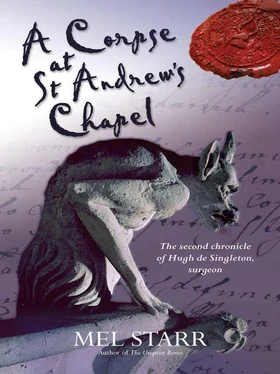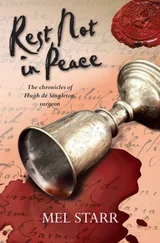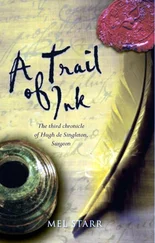Mel Starr - A Corpse at St Andrew's Chapel
Здесь есть возможность читать онлайн «Mel Starr - A Corpse at St Andrew's Chapel» весь текст электронной книги совершенно бесплатно (целиком полную версию без сокращений). В некоторых случаях можно слушать аудио, скачать через торрент в формате fb2 и присутствует краткое содержание. Год выпуска: 2010, Издательство: Kregel Publications, Жанр: Исторический детектив, на английском языке. Описание произведения, (предисловие) а так же отзывы посетителей доступны на портале библиотеки ЛибКат.
- Название:A Corpse at St Andrew's Chapel
- Автор:
- Издательство:Kregel Publications
- Жанр:
- Год:2010
- ISBN:нет данных
- Рейтинг книги:5 / 5. Голосов: 1
-
Избранное:Добавить в избранное
- Отзывы:
-
Ваша оценка:
- 100
- 1
- 2
- 3
- 4
- 5
A Corpse at St Andrew's Chapel: краткое содержание, описание и аннотация
Предлагаем к чтению аннотацию, описание, краткое содержание или предисловие (зависит от того, что написал сам автор книги «A Corpse at St Andrew's Chapel»). Если вы не нашли необходимую информацию о книге — напишите в комментариях, мы постараемся отыскать её.
A Corpse at St Andrew's Chapel — читать онлайн бесплатно полную книгу (весь текст) целиком
Ниже представлен текст книги, разбитый по страницам. Система сохранения места последней прочитанной страницы, позволяет с удобством читать онлайн бесплатно книгу «A Corpse at St Andrew's Chapel», без необходимости каждый раз заново искать на чём Вы остановились. Поставьте закладку, и сможете в любой момент перейти на страницу, на которой закончили чтение.
Интервал:
Закладка:
With two sets of fingers closing the wound I could work quickly, and in but a few moments was able to stitch shut the laceration. Alice used her free hand to squeeze blood from the dripping apron, then dabbed at the fresh effusions as I worked.
The old woman who had set off for an egg returned as I pulled the last suture tight. I broke her egg in a cup from my instrument box and removed the yolk. The albumen I spread over the stitched wound.
Normally I follow the practice of Henry de Mondeville, who taught that wounds heal best when dry. Therefore I apply few salves to a cut such as Philip received, preferring only to wash the wound in wine. But I thought in this case a poultice might serve, for a few days. I bound Philip’s neck in strips of linen, then assisted him to a sitting position.
Philip’s eyes wandered and I thought he might swoon. His face was white and his lips pale blue. I had thought to ask some of the gawkers to assist him to his feet and see him down the High Street to his home and bakery on Broad Street. This could not be done. Philip had lost too much blood.
I sent Will Shillside to the carpenter’s shop for a plank and two poles. When he returned I instructed two men to lift the baker onto the plank, his feet and arms dangling on either side, and with a pole crosswise at each end four spectators bore him home. I told Philip I would visit him on the morrow and that he must rest ’til then.
As the bearers moved off with Philip I heard another commotion and looked up to see the baker’s wife come panting up to her husband. She had been tardily informed of her husband’s hurt.
I stood aside while three women competed with one another to tell the lurid details, including some particulars of which I was unaware.
When they had done I spoke, and told her to see that her husband did not rise from his bed until the morrow, when I would call. The woman nodded understanding, shook flour from her apron, and wordlessly followed her husband toward Broad Street. She took the news well, I thought. Too well, as it happened.
I turned to Edmund, still standing at his forge. “Release him,” I told his captors, who were holding his arms but loosely anyway.
“What have you to say of this matter?” I asked the smith. He did not reply, but looked to his feet and with a toe began rearranging clinkers on the floor of his forge.
“What did you argue about with Philip that came to this?” I pressed, and nodded to the bloodstains soaked now into the dirt of the street but yet visible.
“Ask Philip,” the smith replied. “’Twas he come to me.”
“What about?”
The smith was silent, and went to stirring ashes with a toe again.
“If he complains of you to the manor court you will be compelled to speak.”
“He’ll not, I think.”
“Why? Because he brought the first blow?”
“Aye…there’s that,” Edmund agreed.
“And there is more?” I waited, but received no reply.
I was sure there was more to this tale but could not get it from the smith. I gave up, waved his captors off, and set out for the castle with my instrument box tucked under my arm. Alice was waiting for me at the bridge, gazing down into the brook. Her hands were free of the baker’s blood. She must have washed them in the stream.
“You did well,” I told her, and joined her at the rail.
“Will the baker live?” she asked.
“Aye. Unless he attacks the smith again before his wound heals.”
“Would ’e ’ave died had you not sewed ’im up?”
“Probably.”
Alice was silent for a moment, staring upstream at the mill and its wheel. I was about to suggest that she would be needed at the castle when she spoke.
“Did you see me brother?”
“Your brother? Where?”
“In the crowd, watchin’ as you sewed up the baker.”
“I paid little attention. Which brother?”
“Henry.”
Alice had two half-brothers, born of her father’s first marriage. These two were angered when their father married a second time, fearing loss of patrimony. What they expected to gain from their father, a poor cotter with a quarter yardland and a scrawny pig, I cannot tell.
Henry, I presume, gained his father’s quarter yardland, the hut, and anything Alice left in it. He is a tenant of the Bishop of Exeter. I am not informed of the business of that manor in the Weald, though the property be but across Mill Street from the castle.
“I was anxious for Philip,” I said. “I remember Will Shillside looking on, and a few others. I did not notice your brother.”
“He was at the edge of the crowd. I saw ’im when I came up wi’ the lad you sent t’fetch the box.”
She looked down at my instrument case. I could not tell where this conversation was going. Perhaps nowhere, for Alice became silent again. I am a patient man. The girl had, I thought, more to say. I listened to the mill wheel creaking as it turned, and to the splash of water through the sluice. We were so still and silent that a small trout ventured out from the shadow of the bridge and positioned itself below us, waiting for the current to bring a meal its way.
“I saw ’em when I was kneelin’…when you asked for help.”
“Saw what?”
“The shoes. I was down close to the ground, like, an’ you notice things down there you don’t when standin’ up.”
“Your brother’s shoes?” I guessed. I had a feeling I now knew what the girl wanted to say, and why she found it difficult.
“Aye. Him as hardly ever owned any, as I remember. Least, not like them ’e wore today.”
“Did he never wear shoes, even in winter?”
“Oh, aye…but made ’em hisself. Never paid cobbler for shoes.”
“And what of the shoes he wore today?”
“Wood soles. Thick, like they was new, an’ leather t’bind ’em to ’is feet. Soft leather, ’twas. Tanned.”
“Like those missing from the feet of Alan the beadle?”
Alice nodded her head and gazed back toward the mill. For all the mistreatment she had endured at her brother’s hands, she no doubt felt disloyal for bringing me this report. And, perhaps, apprehensive that her brother might learn of her disclosure.
The girl remained silent, her eyes on the turning mill wheel but not, I think, seeing it.
“The blue yarn,” she whispered. “Henry once had a cotehardie of blue. ’Twas old and faded last I saw it.”
“Threadbare?” I asked.
“Aye…tattered, like.”
“So that loose threads might fall from, say, a ragged sleeve?”
“Aye.”
“When did you last see your brother wear such a garment?”
“Before I came t’live in castle, sir. I see little of Henry now, so what he owns I know not, but ’twas before father died I last saw ’im wi’ the old blue cotehardie.”
“You have performed two good services this day,” I told her. “I will see to this business of your brother’s new shoes and old blue cotehardie. Rest easy. He will not learn how my suspicion was aroused.”
A look of relief brightened her face.
“Run back to the castle and explain my absence at dinner to the cook. Ask him to send a meal to my chamber. I will be there straightaway.”
“Aye, sir,” she chirped, and set off as I directed. I watched with pleasure as she hastened away. Well, there was nothing much else to look at; I had already viewed the mill and stream.
Chapter 5
After a cold dinner in my reeking chamber I made my way across Mill Street to the path leading along Shill Brook and the cottages in the Weald. These were the bishop’s tenants. I had not had cause to venture down this lane since I treated Alice’s father, unsuccessfully, for his broken hip.
His hut lay in disrepair, the toft overgrown and the door fallen from its leather hinges. Whatever of the man’s possessions his sons thought valuable enough to keep from Alice, this dwelling was not among them.
Читать дальшеИнтервал:
Закладка:
Похожие книги на «A Corpse at St Andrew's Chapel»
Представляем Вашему вниманию похожие книги на «A Corpse at St Andrew's Chapel» списком для выбора. Мы отобрали схожую по названию и смыслу литературу в надежде предоставить читателям больше вариантов отыскать новые, интересные, ещё непрочитанные произведения.
Обсуждение, отзывы о книге «A Corpse at St Andrew's Chapel» и просто собственные мнения читателей. Оставьте ваши комментарии, напишите, что Вы думаете о произведении, его смысле или главных героях. Укажите что конкретно понравилось, а что нет, и почему Вы так считаете.












